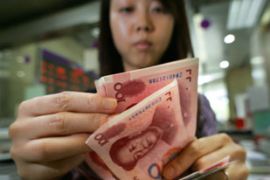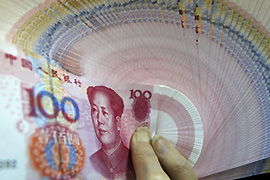US ups pressure on China over yuan
Senators introduce bill threatening sanctions if China does not let currency float.

Wen also blamed the US for increased tensions between Washington and Beijing, which have come amid rows over US arms sales to Taiwan, a White House visit by the Dalai Lama and a raft of other disputes.
‘Last straw’
Chuck Schumer, a Democratic senator, told reporters at a Washington news conference on Tuesday to unveil the proposed bill that Wen’s comments were “the last straw”.
|
“When there’s a 20 per cent or 30 per cent undervaluation that reduces the price of a product coming in, that’s not fair. That’s cheating” Debbie Stabenow, Democratic Senator |
“When Premier Wen said that China’s currency is not overvalued two days ago, that was the last straw and here we are to tell them we are going to force you to do it – plain and simple,” he said.
“There is no bigger step that we can take to promote job creation here in the US than to confront Chinese currency manipulation.”
Debbie Stabenow, a Democratic senator and co-sponsor of the legislation, said China was not playing fair by keeping the yuan fixed at a level below market rates.
“When there’s a 20 per cent or 30 per cent undervaluation that reduces the price of a product coming in, that’s not fair. That’s cheating,” she said.
However, a policy briefing released by a United Nations trade agency, also on Tuesday, backed China’s position, urging Beijing to reject pressure to allow the yuan to float.
‘Currency chaos’
The briefing by the UN Conference and Trade and Development (UNCTAD) defended China as a leader in stimulating domestic demand and the global economy.
UNCTAD argued that market forces have caused “currency chaos” and that international control of exchange rates would be a better course to follow.
Leaving currencies to irrational market forces “will not help rebalance the global economy”, and a Chinese move to allow the yuan to float would risk an economic shock akin to the one Japan suffered in the 1990s, it said.
That, in turn, could destabilise the entire world economy.
“Expecting that China will leave its exchange rate to the mercy of totally unreliable markets and risk a Japan-like appreciation shock ignores the importance of its domestic and external stability for the region and for the globe,” UNCTAD said.
Criticism
The unveiling of the proposed US bill comes as politicians in Washington ramp up criticism of China ahead of the November mid-term elections, blaming Chinese policy for the growing US jobless rate.
 |
| The row over the yuan’s value has fuelled tensions between the US and China [Reuters] |
Sam Brownback, another supporter of the bill, said he expected a “huge vote” both in the House of Representatives and the senate, on the legislation.
This will enable the Obama administration “to do what it needs to do”, he said.
Last week Barack Obama, the US president, used a speech in Washington to urge China to help rebalance the global economy by moving towards “a more market-oriented exchange rate”.
On Monday, a letter signed by 130 Democratic and Republican members of congress called on the US treasury to brand China a currency manipulator in a report due next month, saying Beijing was in effect subsidising exports.
“The impact of China’s currency manipulation on the US economy cannot be overstated,” they said in the letter submitted to Timothy Geithner, Obama’s treasury secretary.
Speaking on US television on Tuesday, Geithner said China’s policy on the yuan was “a very important issue” not only for US-China relations but for all trading partners of the Asian giant, adding that the ball was in Beijing’s court.
“I think they’ll decide, ultimately, it’s in their interests to move,” he told Fox Business Television.